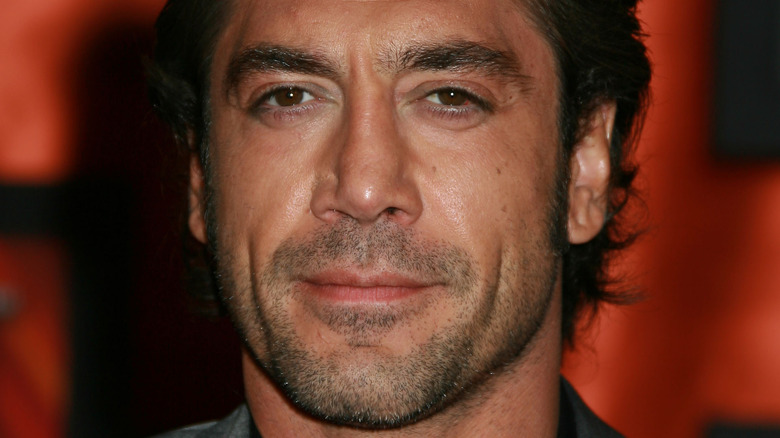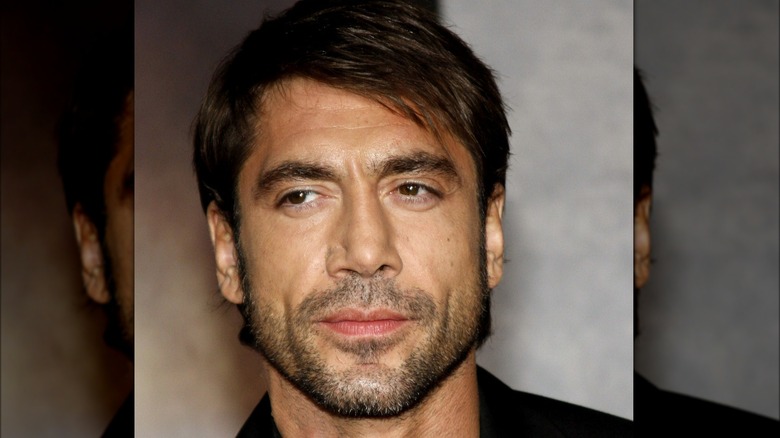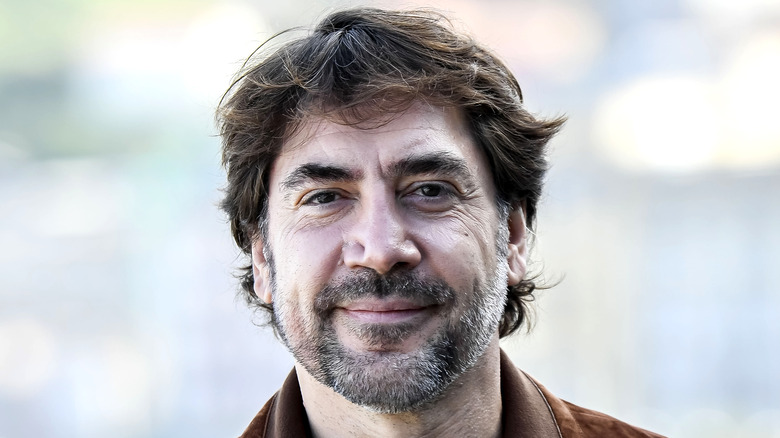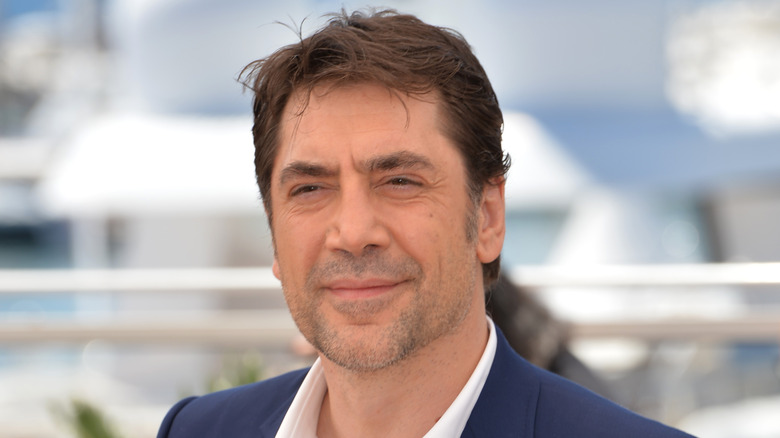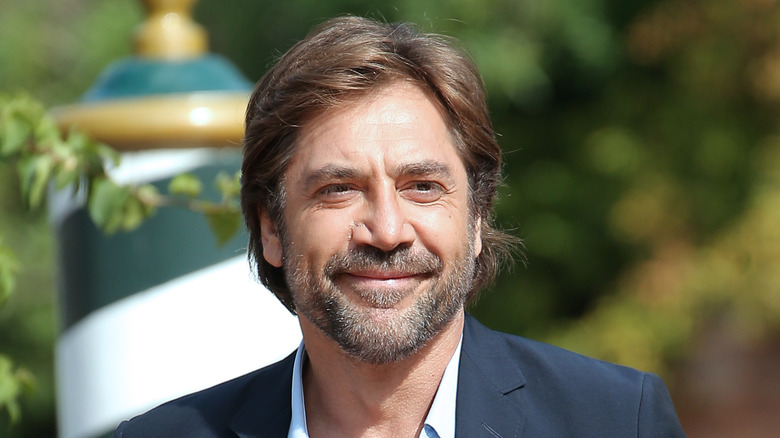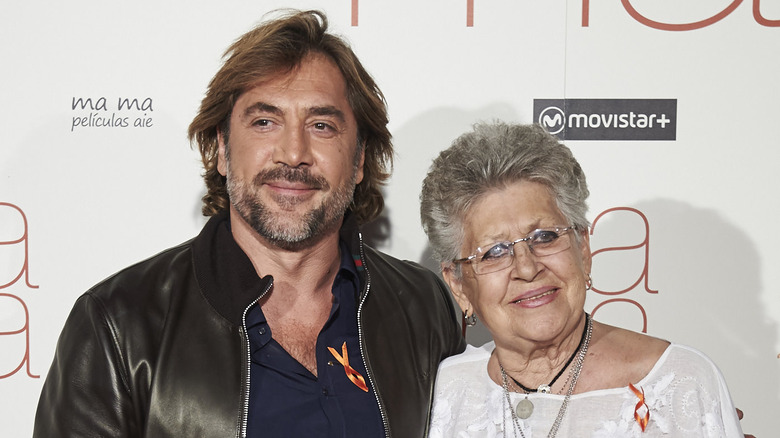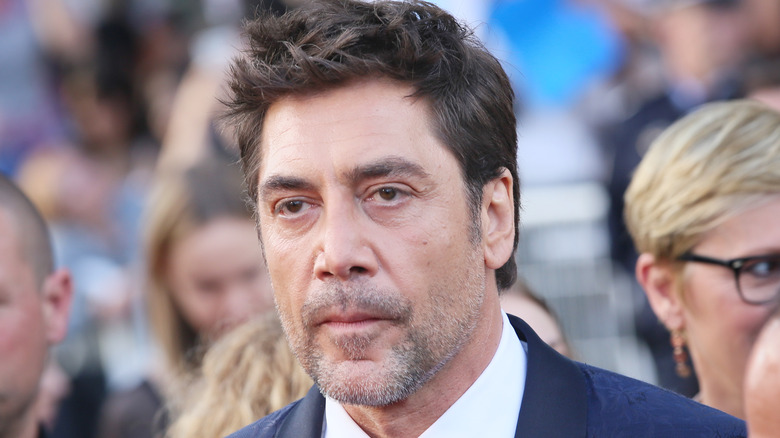The Tragic Real-Life Story Of Javier Bardem
The following article includes mentions of suicide.
Javier Bardem's stardom is lost on no one but himself. When he won the Oscar in 2007 for best supporting actor after playing the deadly Anton Chigurh in "No Country for Old Men," he admitted that he was baffled. When asked by The Guardian in 2021 if the win gave him a sense of security, his answer was telling. "No! No, no, no, no! When I won the Oscar, I felt great, but it didn't make any sense," Bardem replied. "It was more: 'Wow, what is this? I need to earn this now so they don't take it out of my hands!'"
Bardem's status as a Hollywood sex symbol is equally puzzling to him. "I don't see this heart-throb thing at all," he previously told the Independent. While Bardem can continue being confused about why he's so desirable, both as a hunk and an actor, the rest of us know what's up. The Spanish star broke into the American cinematic world thanks to hits like Woody Allen's "Vicky Cristina Barcelona" and "Eat Pray Love," but he never aspired to be an actor. In fact, Bardem told NPR that his dream was to be a painter, and he only took on acting roles to pay the bills. "But little by little, I got into the movies by doing some work as an extra so I could get some money and keep on painting. One day, they offered me these couple of lines and ... I did it and I felt great. I felt like ... I belong here."
But the road wasn't always easy for Javier Bardem.
Javier Bardem's family struggled financially
Javier Bardem grew up in the Canary Islands, an archipelago belonging to Spain off the coast of Africa, per Hello! magazine. His father, José Carlos Encinas, left his mother, the Spanish actor Pilar Bardem, when Javier was a child. Since she was alone raising her children and simultaneously called to acting, he understood that a life in cinema could lead to financial hardship. "I saw it from the inside, I knew how difficult it was," Bardem said of acting to The Guardian. But showbiz ran in his family — in addition to his director uncle, Juan Antonio Bardem, the future star's grandparents also got into the acting game. Nevertheless, things were tight for the Bardems.
The financial struggle and the abandonment of his father made their family extremely tight knit. "My parents separated when I was small, but we were so close — my mother, my brother and my sister," Javier told GQ in 2017. "We were like a gang of wolves. We would attack anyone we felt was a threat." He noted that his single mother "had to make money where she could," and there's certainly a bond there. In an interview with the Independent, Bardem lovingly called them a "family of crazy people."
His mother continued to work her whole life and things came full circle in the 1987 film "Live Flesh," when she played Penélope Cruz's mother, with Javier also appearing in the movie. Javier later married Cruz, making it seem like the cinema world is a lot smaller than it actually is.
His troubled relationship with his father
When Javier Bardem's father, José Carlos Encinas, left his mother, he created a vacancy that impacted the actor for the rest of his life. His mother was stuck caring for the family and picking up the financial responsibilities alone, which meant that Bardem was often unsupervised. "As a kid, I was left to my own devices," he told GQ. "My father was absent. I had no dominant male figure to look up to. This isn't a complaint, just a fact. It meant I had to test myself. I had to figure out my own boundaries. It meant I made mistakes."
1995 saw a 25-year-old Bardem lose his father, and the actor admitted to The Telegraph in 2011 that he missed the chance to have a real conversation with Encinas, to hear him and forgive him before he died. "I'm always saying I wasn't the man I would have liked to have been when my father died," Bardem said, admitting that he didn't yet have the maturity to connect with his father in a non-judgmental way.
But his father's death created a religious shift for Bardem. While he's an atheist, his Catholic roots came back in a powerful way when he lost his dad. "I wasn't a very committed Catholic before, but when that happened it suddenly all felt so obvious: I now believe religion is our attempt to find an explanation; to feel more protected," he told the Independent. It didn't make him religious, but it did create a spiritual softening that he carried with him.
Javier Bardem's struggle as an actor
Breaking into the acting world was no easy feat for Javier Bardem, and once he did tap into Hollywood, the feeling of isolation didn't abate. His perceived language barrier meant that he always felt like the odd man out and imposter syndrome meant that he never believed he could properly take on a role. ”When I first saw the movie, I almost killed myself,” he told The New York Times about 2000's "Before Night Falls," a film about the gay Cuban writer Reinaldo Arenas, who died by suicide amid an AIDS-related illness in 1990. "... I look at myself, and I see a Spanish person who's trying to be understood by an English-speaking audience and is putting a lot of energy in that, instead of into expressing in a free way and feeling comfortable."
The sense of loneliness was no different when Bardem played Anton Chigurh in the Coen brothers' "No Country For Old Men," exacerbated again by the language and cultural differences. "I felt isolated for many reasons," Bardem told The Telegraph. "I was the only foreign guy on the whole set, and being in deep Texas is a hard place for a Spaniard to be." But Bardem's saving grace in all of this was his mother and her message to him of what it meant to be an actor. He told The Telegraph that she warned him never to buy into any of it: the fame or the criticism. Instead, she saw it as a right and privilege to work as a performer, and that was enough.
If you or anyone you know is having suicidal thoughts, please call the National Suicide Prevention Lifeline at 1-800-273-TALK (8255).
Violence in his past made the actor wary
For whatever reason, Javier Bardem has a long history of being cast as the villain. He played James Bond's nemesis Raoul Silva in the 2012 movie "Skyfall" with bleach-blond hair and a coolness that gave viewers the creeps. Perhaps his most famous role, and the one he won an Oscar for, was playing Anton Chigurh in "No Country for Old Men," where he's a calm and ruthless killer with a particular sense of morality that somehow contributes to his ruthlessness.
Despite the violence that Bardem shows through his characters, the actor is vehemently against any form of brutality in real life. When he was young, Bardem was in a bar and got into such a bad fight he nearly died. "If my friends hadn't been there those guys would have killed me," Bardem told GQ. "It drove home a sense of mortality for me. I learnt about respect, about keeping my boundaries, about keeping my mouth shut sometimes, about friendship, and about how violence will always come back to you."
The brutal fight had long-term effects on the actor, too, and he takes an extreme stance now against any kind of cruelty. "From that moment on I couldn't stand violence," he added. "I still can't even watch it. I can't bare it." Bardem stressed this again while speaking with The Guardian, saying that violence never does any good. So how does he justify this with acting? Bardem says that it's simply creating characters; real life and family life are what count.
He's spoken about the death of his mother
In July 2021, Javier Bardem's mother, Pilar Bardem, died in Madrid of lung disease, Deadline reported, at age 82. Javier's wife, Penélope Cruz, shared a touching tribute for her mother-in-law on Instagram. "You were always so good to me," Cruz wrote in part (as translated by Deadline). "I couldn't have dreamed of having a better mother-in-law. Thank you for all the love that you've given us, your children, grandchildren, family, and friends."
The legacy of his mother continues to impact Javier, even as an actor, since she also knew the terrain, and he still relies on his mother as a guiding light. "Every decision I make now, I think: 'Would this make my mother proud?' And if not, I immediately reject it," Javier told The Guardian that December. "That's a powerful legacy to leave, but she was a very powerful person."
The reason that Javier leans on his mother still for her creative inspiration is because he knew how hard she had to work to be an actor, especially as a woman and a single parent in Spain. The dedication to the art form also came with stigma at the time. "In 1960s Spain, it was a very hard time to be a woman, especially divorced with three kids and an actress," Javier noted to The Guardian. "You were referred to as a prostitute." So if his mother could stay dedicated to acting despite these hurdles, Javier knew he had no excuse and used the art as a legacy to her memory.
The tragic reason behind Javier Bardem's political passion
Javier Bardem's family has deep roots in political activism, something that goes all the way back to his childhood. He spoke about the Spanish dictator Francisco Franco and the role that the Catholic Church played in his upbringing. "I was five when Franco died, and the Church had a very strong link with the dictatorship," Bardem told The Telegraph. "And that shadow has been very big for my generation." The actor said it was natural that he grew up with a passion for politics "because of the background of my family, the persecution they suffered from trying to fight for freedom ... you take it with you, and then once you take it, it's yours for the rest of your life."
This zeal got him into trouble later on, however, and in 2020, Bardem had to issue an apology after calling Mayor José Luis Martínez Almeida of Madrid "stupid" and for going after then-President Donald Trump on Twitter, per Spain's News. He was upset with both leaders for their lack of dedication to the climate and noted that Almeida was becoming lenient on car pollution in Madrid. Bardem later apologized, noting that "the insult illegitimizes any speech and conversation," according to Spain's News, and he further admitted that he allowed himself to "be carried away by an impulse." But it's worth noting that Bardem has not slowed in his longtime advocacy and commitment to combating climate change.

